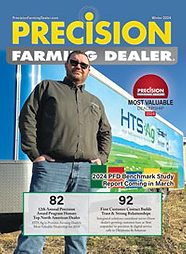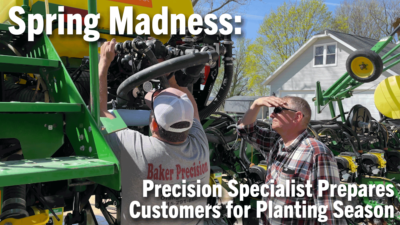Editor's Note: Lance Formwalt and John Fuchs are members of the Equipment Dealer Group and the Data, Privacy, and Technology Group at Seigfreid Bingham, P.C. The firm also serves as legal counsel to the North American Equipment Dealers Association, the Western Equipment Dealers Association and several other regional dealer associations.
Today’s farm equipment includes computers and technology systems ranging from engine controls, to guidance systems, to media and entertainment systems. Making each system work is computer software. The rights of your customers and manufacturers are spurring a lot of commentary because the U.S. Copyright Office is considering a special exemption to enable repair and modification of farm equipment software without manufacturer permission.
In a recent article on Wired.com, Kyle Wiens stated that John Deere is seeking to enact a “twisted vision of ownership” of farm equipment where farmers do not own their equipment. This makes for fun reading, but it is an exaggeration. John Deere’s position (and the position of the Assn. of Equipment Manufacturers) is that the farmer owns the equipment, but has a license to use the software included in the equipment for the life of the equipment. John Deere’s approach is based firmly in basic copyright law and the license the farmer gets is no different then the license you get to use the software on your home computer or your mobile phone.
Copyright law prevents purchasers from creating new copies of written materials, whether it is a book or software. This restriction isn’t workable for software because you need to be able to make multiple copies just to use it (a “copy” is made every time a software program is run). As a result, software owners give you a license to be able to make copies of the software so that you can use it. These licenses do not allow you to reverse engineer or sell the software to others.
To help enforce the restrictions on resale or reverse engineering, digital “locks” are included in software. These locks also prevent modifications or repairs to the software without manufacturer permission. The Digital Millennium Copyright Act, or “DMCA”, helps protect these digital locks by prohibiting the development of tools that break through the locks.
The Copyright Office is considering an exemption to allow programmers to break into the software embedded in a vehicle, including farm equipment. The current publicity from the Wired.com article is only occurring because manufacturers, including John Deere and General Motors, are giving their reasons why the exemption from current law should be denied. The Copyright Office will likely make a decision later this summer.
The Manufacturer Position
Manufacturers say protecting digital locks in software is critical to ensure that the equipment is not modified by hackers or do-it-yourself repairmen in a way that can negatively affect the equipment’s performance. They fear that unauthorized modifications will create new dangers for repairmen and used equipment purchasers, excessive wear and tear, the alteration or removal of safety and environmental protection measures required by law, or even the destruction of the equipment’s entire computer system.
The Consumer Advocate Position
Wiens argues, both in the article and in comments submitted to the Copyright Office by his company, iFixIt.com, that farmers need to be able to remove digital locks from equipment software so they can modify or repair it without the manufacturer’s permission, similar to after-market mechanical modifications and repairs.
Who’s Right?
Due to the product safety issues involved, we think that the manufacturer position is most appropriate. While we understand the desire of customers to have free rein to make decisions about repairs and modifications, mechanical modifications are generally easy to spot from an inspection. That is not true with software modifications. Software modifications can often only be identified by running the software and operating the equipment. This could make repair work more dangerous and create problems for future purchasers who expect the equipment to operate in accordance with the manufacturer’s manual. Each of these things should pose concern for you as dealers.
When farmers purchase equipment, they are purchasing a license to use the software. That is the same deal every user of an iPod, a Nest smart thermostat, a laptop, or a website browser agrees to each time they use those systems. We certainly recognize that the law’s protection of digital locks has been criticized, but creating a special exemption for vehicle and farm equipment software will only address one issue in a specific industry and we don’t see the justification for treating farm equipment software differently then other technology products. The more appropriate way to address these issues is through a legislative debate over software and related repair rights generally, a debate that is currently occurring in several state legislatures considering “Right to Repair” laws.








Post a comment
Report Abusive Comment